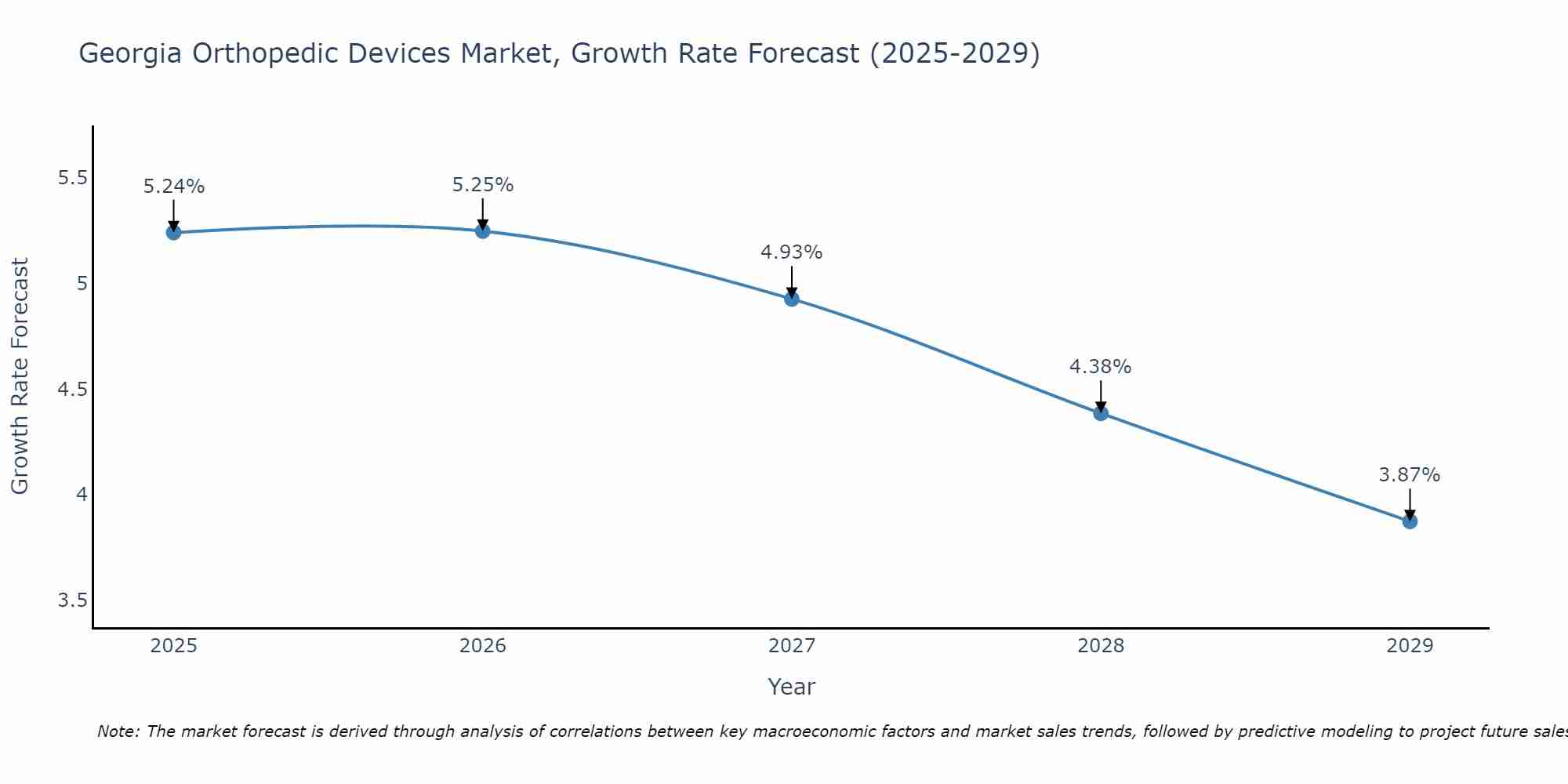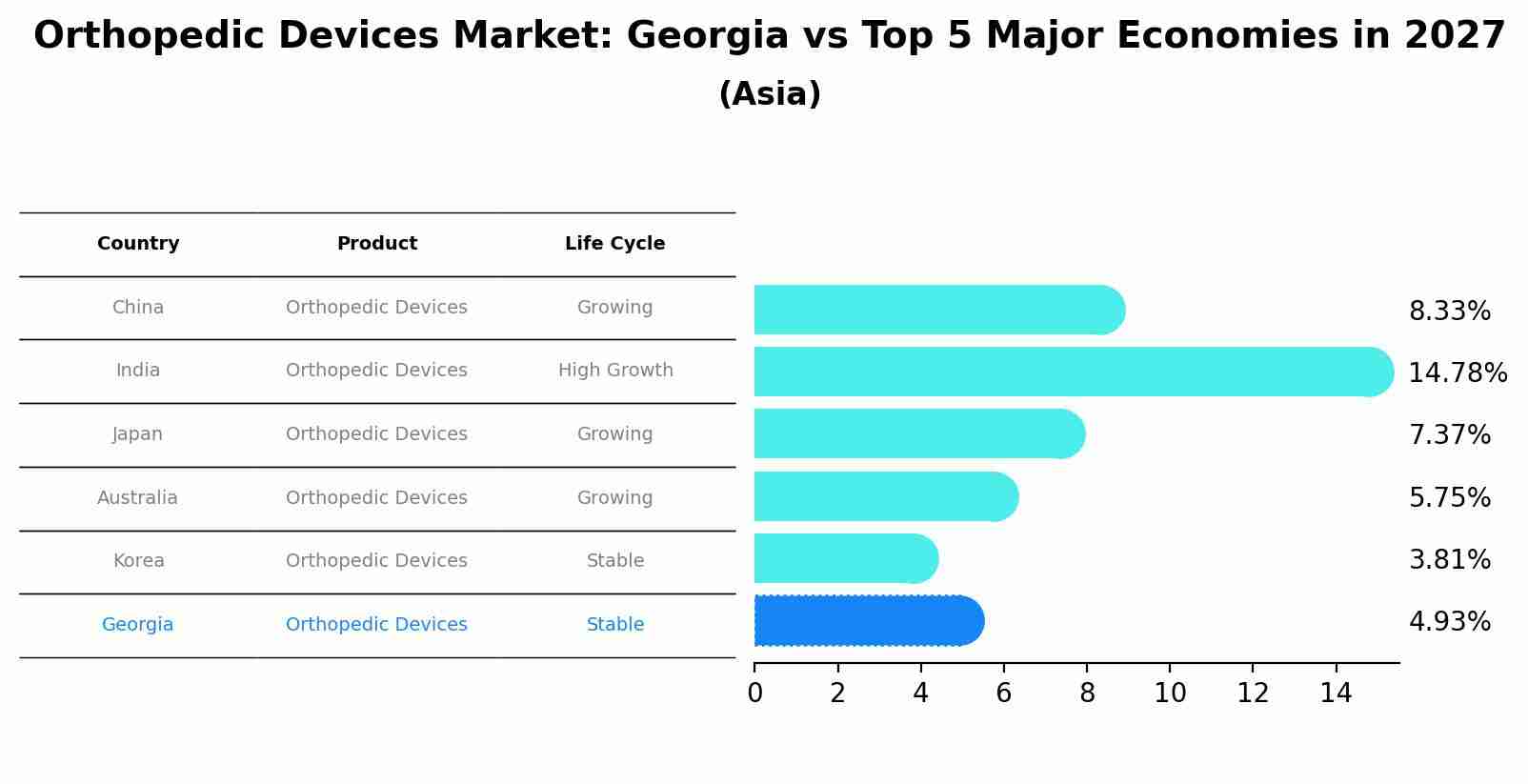Georgia Orthopedic Devices Market Outlook | Forecast, Analysis, Share, Growth, Value, Trends, Revenue, Companies, COVID-19 IMPACT, Industry & Size
| Product Code: ETC368160 | Publication Date: Aug 2022 | Updated Date: Jul 2025 | Product Type: Market Research Report | |
| Publisher: 6Wresearch | Author: Vasudha | No. of Pages: 75 | No. of Figures: 35 | No. of Tables: 20 |
Georgia Orthopedic Devices Market Size Growth Rate
The Georgia Orthopedic Devices Market is projected to witness mixed growth rate patterns during 2025 to 2029. Growth accelerates to 5.25% in 2026, following an initial rate of 5.24%, before easing to 3.87% at the end of the period.

Orthopedic Devices Market: Georgia vs Top 5 Major Economies in 2027 (Asia)
Georgia's Orthopedic Devices market is anticipated to experience a stable growth rate of 4.93% by 2027, reflecting trends observed in the largest economy China, followed by India, Japan, Australia and South Korea.

Georgia Orthopedic Devices Market Synopsis
The Georgia Orthopedic Devices Market is a dynamic sector characterized by a growing demand for orthopedic implants, instruments, and devices driven by an aging population and a rise in orthopedic disorders. Key players in the market include large multinational corporations as well as smaller local manufacturers and distributors. The market is highly competitive, with companies focusing on innovation, product differentiation, and strategic partnerships to gain a competitive edge. Georgia`s strong healthcare infrastructure, skilled workforce, and favorable business environment have attracted investments in research and development, manufacturing, and distribution of orthopedic devices. Regulatory compliance, reimbursement policies, and technological advancements are key factors shaping the market landscape in Georgia, with a focus on improving patient outcomes and reducing healthcare costs driving market growth.
Georgia Orthopedic Devices Market Trends
The Georgia Orthopedic Devices Market is currently seeing a shift towards minimally invasive procedures and advanced technologies such as robotic-assisted surgeries. Surgeons and patients are increasingly opting for these innovative techniques due to reduced recovery times, lower risk of complications, and improved surgical precision. Additionally, there is a growing demand for personalized orthopedic devices, such as 3D-printed implants, tailored to individual patient anatomy for better outcomes. The market is also witnessing increased adoption of biodegradable implants and materials, promoting better long-term patient outcomes and environmental sustainability. Overall, the Georgia Orthopedic Devices Market is evolving towards more efficient, precise, and patient-centric solutions to meet the demands of both healthcare providers and patients.
Georgia Orthopedic Devices Market Challenges
In the Georgia orthopedic devices market, challenges may include increasing competition from both domestic and international manufacturers, pricing pressures due to healthcare cost containment efforts, regulatory hurdles for product approvals and compliance, and the need for continuous innovation to meet evolving patient needs and technological advancements. Additionally, economic uncertainties and fluctuations in healthcare policies can impact purchasing decisions by healthcare providers and affect the overall market demand. Adapting to changing reimbursement structures and addressing issues related to product quality and patient safety are also significant challenges faced by companies operating in the Georgia orthopedic devices market. Staying abreast of industry trends, investing in research and development, and building strong partnerships with healthcare institutions can help companies navigate these challenges and maintain a competitive edge in the market.
Georgia Orthopedic Devices Market Investment Opportunities
The Georgia orthopedic devices market offers various investment opportunities due to the growing demand for advanced medical technologies and the increasing prevalence of orthopedic conditions among the aging population. Investing in companies that specialize in developing innovative orthopedic implants, surgical tools, and orthobiologics could be lucrative. Additionally, investing in orthopedic clinics or outpatient surgery centers in Georgia could yield high returns, as more patients seek minimally invasive orthopedic procedures for quicker recovery times. With the state`s strong healthcare infrastructure and a supportive business environment, investors can capitalize on the expanding orthopedic market in Georgia by aligning with reputable manufacturers, distributors, or healthcare providers to drive growth and innovation in this sector.
Jordan Agar Market Government Policies
The Georgia Orthopedic Devices Market is subject to various government policies aimed at regulating the production, sale, and distribution of orthopedic devices within the state. These policies typically include adherence to quality standards set by the Food and Drug Administration (FDA), licensing requirements for manufacturers and distributors, and regulations governing the advertising and promotion of orthopedic devices. Additionally, reimbursement policies set by government healthcare programs such as Medicare and Medicaid can impact the market by determining which devices are eligible for coverage. Furthermore, policies related to intellectual property rights and trade agreements may also influence the market dynamics for orthopedic devices in Georgia. Compliance with these policies is essential for companies operating in the Georgia Orthopedic Devices Market to ensure product quality, patient safety, and market access.
Georgia Orthopedic Devices Market Future Outlook
The Georgia Orthopedic Devices Market is poised for significant growth in the coming years, driven by factors such as an aging population, increasing prevalence of orthopedic disorders, and advancements in technology. The market is expected to witness a rise in demand for orthopedic implants, prosthetics, and other devices as the population continues to age and the incidence of musculoskeletal conditions rises. Additionally, the increasing adoption of minimally invasive procedures and the development of innovative orthopedic technologies will further fuel market growth. With a favorable regulatory environment and a strong healthcare infrastructure in Georgia, the orthopedic devices market is likely to experience steady expansion, presenting opportunities for manufacturers, healthcare providers, and investors in the region.
Key Highlights of the Report:
- Georgia Orthopedic Devices Market Outlook
- Market Size of Georgia Orthopedic Devices Market, 2021
- Forecast of Georgia Orthopedic Devices Market, 2031
- Historical Data and Forecast of Georgia Orthopedic Devices Revenues & Volume for the Period 2018 - 2031
- Georgia Orthopedic Devices Market Trend Evolution
- Georgia Orthopedic Devices Market Drivers and Challenges
- Georgia Orthopedic Devices Price Trends
- Georgia Orthopedic Devices Porter's Five Forces
- Georgia Orthopedic Devices Industry Life Cycle
- Historical Data and Forecast of Georgia Orthopedic Devices Market Revenues & Volume By Application for the Period 2018 - 2031
- Historical Data and Forecast of Georgia Orthopedic Devices Market Revenues & Volume By Hip Orthopedic Devices for the Period 2018 - 2031
- Historical Data and Forecast of Georgia Orthopedic Devices Market Revenues & Volume By Knee Orthopedic Devices for the Period 2018 - 2031
- Historical Data and Forecast of Georgia Orthopedic Devices Market Revenues & Volume By Spine Orthopedic Devices for the Period 2018 - 2031
- Historical Data and Forecast of Georgia Orthopedic Devices Market Revenues & Volume By Craniomaxillofacial Orthopedic Devices for the Period 2018 - 2031
- Historical Data and Forecast of Georgia Orthopedic Devices Market Revenues & Volume By Dental Orthopedic Devices for the Period 2018 - 2031
- Historical Data and Forecast of Georgia Orthopedic Devices Market Revenues & Volume By Sports Injuries, Extremities And Trauma (Set) Orthopedic Devices for the Period 2018 - 2031
- Historical Data and Forecast of Georgia Orthopedic Devices Market Revenues & Volume By Product for the Period 2018 - 2031
- Historical Data and Forecast of Georgia Orthopedic Devices Market Revenues & Volume By Drill Guide for the Period 2018 - 2031
- Historical Data and Forecast of Georgia Orthopedic Devices Market Revenues & Volume By Guide Tubes for the Period 2018 - 2031
- Historical Data and Forecast of Georgia Orthopedic Devices Market Revenues & Volume By Implant Holder for the Period 2018 - 2031
- Historical Data and Forecast of Georgia Orthopedic Devices Market Revenues & Volume By Custom Clamps for the Period 2018 - 2031
- Historical Data and Forecast of Georgia Orthopedic Devices Market Revenues & Volume By Distracters for the Period 2018 - 2031
- Historical Data and Forecast of Georgia Orthopedic Devices Market Revenues & Volume By Screw Drivers for the Period 2018 - 2031
- Historical Data and Forecast of Georgia Orthopedic Devices Market Revenues & Volume By Accessories for the Period 2018 - 2031
- Georgia Orthopedic Devices Import Export Trade Statistics
- Market Opportunity Assessment By Application
- Market Opportunity Assessment By Product
- Georgia Orthopedic Devices Top Companies Market Share
- Georgia Orthopedic Devices Competitive Benchmarking By Technical and Operational Parameters
- Georgia Orthopedic Devices Company Profiles
- Georgia Orthopedic Devices Key Strategic Recommendations
Frequently Asked Questions About the Market Study (FAQs):
- Single User License$ 1,995
- Department License$ 2,400
- Site License$ 3,120
- Global License$ 3,795
Search
Thought Leadership and Analyst Meet
Our Clients
Related Reports
- Afghanistan Apparel Market (2026-2032) | Growth, Outlook, Industry, Segmentation, Forecast, Size, Companies, Trends, Value, Share, Analysis & Revenue
- Canada Oil and Gas Market (2026-2032) | Share, Segmentation, Value, Industry, Trends, Forecast, Analysis, Size & Revenue, Growth, Competitive Landscape, Outlook, Companies
- Germany Breakfast Food Market (2026-2032) | Industry, Share, Growth, Size, Companies, Value, Analysis, Revenue, Trends, Forecast & Outlook
- Australia Briquette Market (2025-2031) | Growth, Size, Revenue, Forecast, Analysis, Trends, Value, Share, Industry & Companies
- Vietnam System Integrator Market (2025-2031) | Size, Companies, Analysis, Industry, Value, Forecast, Growth, Trends, Revenue & Share
- ASEAN and Thailand Brain Health Supplements Market (2025-2031) | Strategy, Consumer Insights, Analysis, Investment Trends, Opportunities, Growth, Size, Share, Industry, Revenue, Segments, Value, Segmentation, Supply, Forecast, Restraints, Outlook, Competition, Drivers, Trends, Demand, Pricing Analysis, Competitive, Strategic Insights, Companies, Challenges
- ASEAN Bearings Market (2025-2031) | Strategy, Consumer Insights, Analysis, Investment Trends, Opportunities, Growth, Size, Share, Industry, Revenue, Segments, Value, Segmentation, Supply, Forecast, Restraints, Outlook, Competition, Drivers, Trends, Demand, Pricing Analysis, Competitive, Strategic Insights, Companies, Challenges
- Europe Flooring Market (2025-2031) | Outlook, Share, Industry, Trends, Forecast, Companies, Revenue, Size, Analysis, Growth & Value
- Saudi Arabia Manlift Market (2025-2031) | Outlook, Size, Growth, Trends, Companies, Industry, Revenue, Value, Share, Forecast & Analysis
- Uganda Excavator, Crane, and Wheel Loaders Market (2025-2031) | Strategy, Consumer Insights, Analysis, Investment Trends, Opportunities, Growth, Size, Share, Industry, Revenue, Segments, Value, Segmentation, Supply, Forecast, Restraints, Outlook, Competition, Drivers, Trends, Demand, Pricing Analysis, Competitive, Strategic Insights, Companies, Challenges
Industry Events and Analyst Meet
Whitepaper
- Middle East & Africa Commercial Security Market Click here to view more.
- Middle East & Africa Fire Safety Systems & Equipment Market Click here to view more.
- GCC Drone Market Click here to view more.
- Middle East Lighting Fixture Market Click here to view more.
- GCC Physical & Perimeter Security Market Click here to view more.
6WResearch In News
- Doha a strategic location for EV manufacturing hub: IPA Qatar
- Demand for luxury TVs surging in the GCC, says Samsung
- Empowering Growth: The Thriving Journey of Bangladesh’s Cable Industry
- Demand for luxury TVs surging in the GCC, says Samsung
- Video call with a traditional healer? Once unthinkable, it’s now common in South Africa
- Intelligent Buildings To Smooth GCC’s Path To Net Zero


















